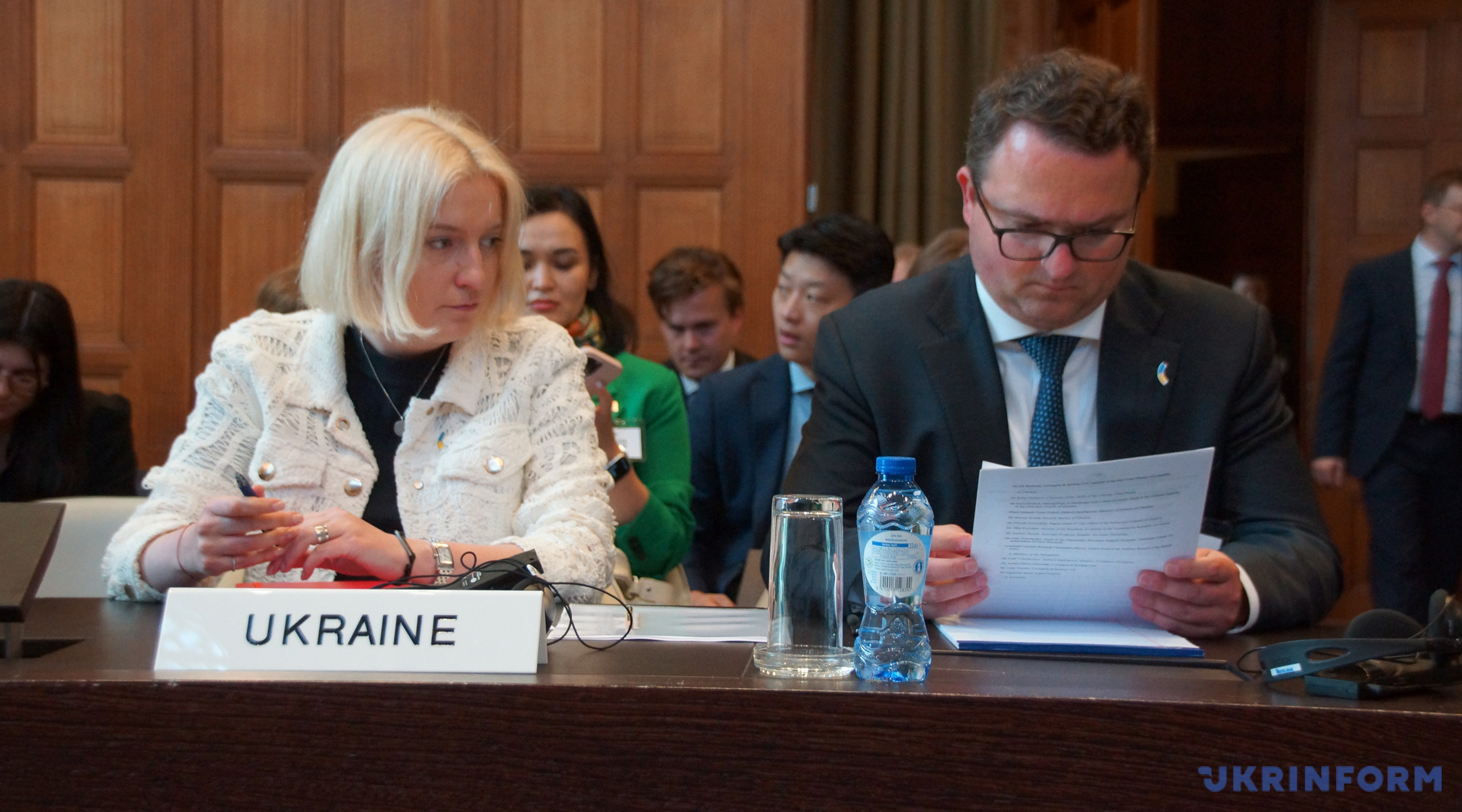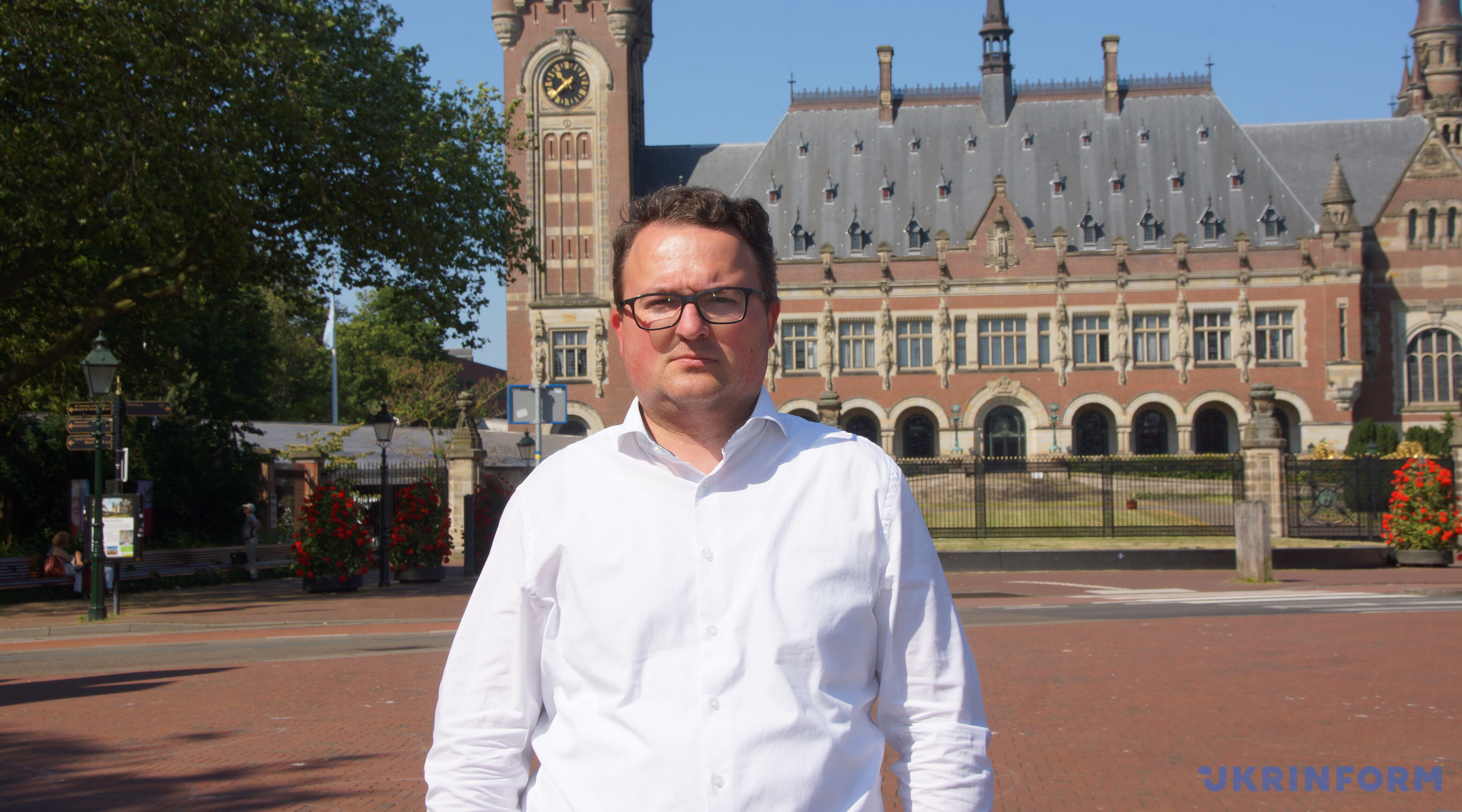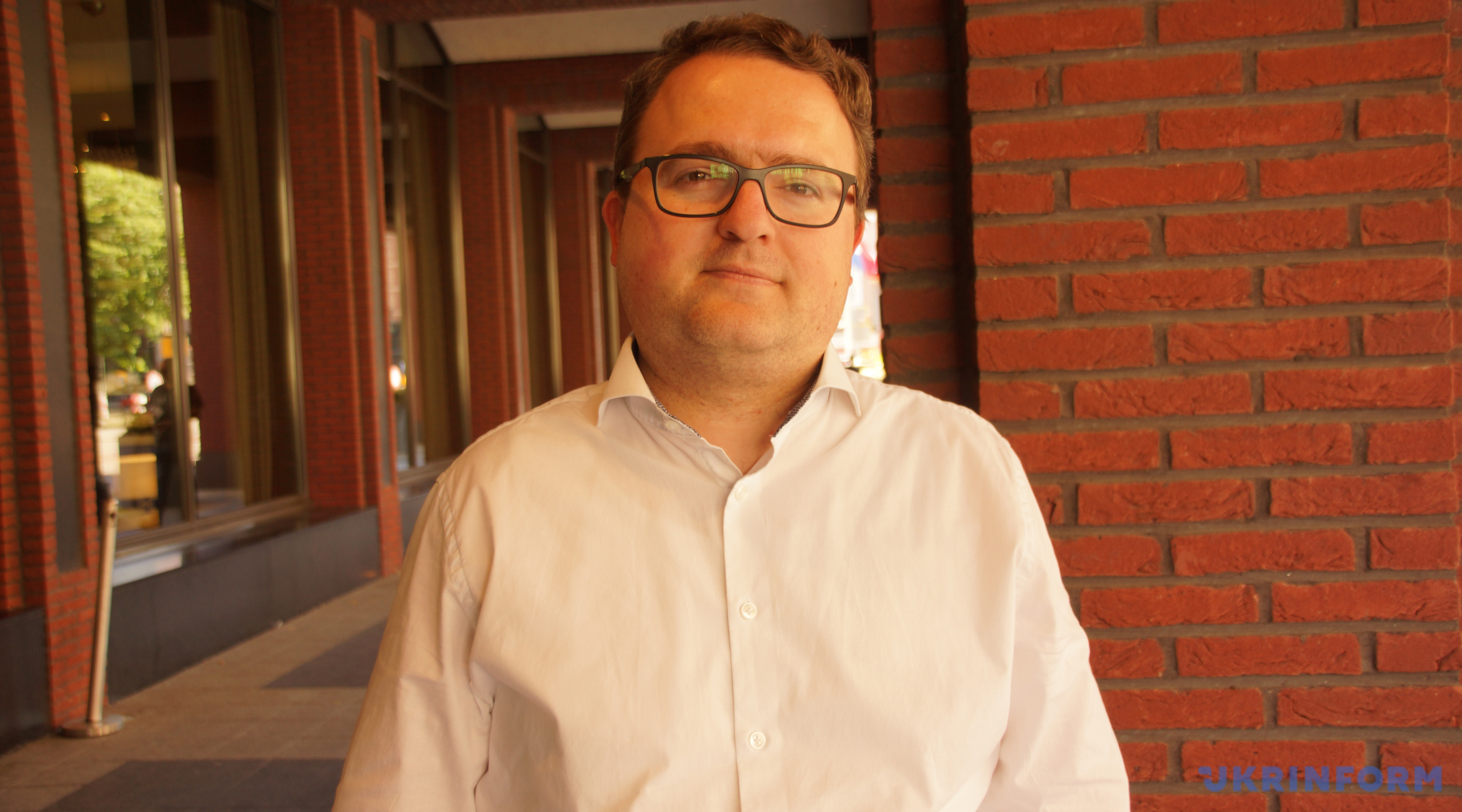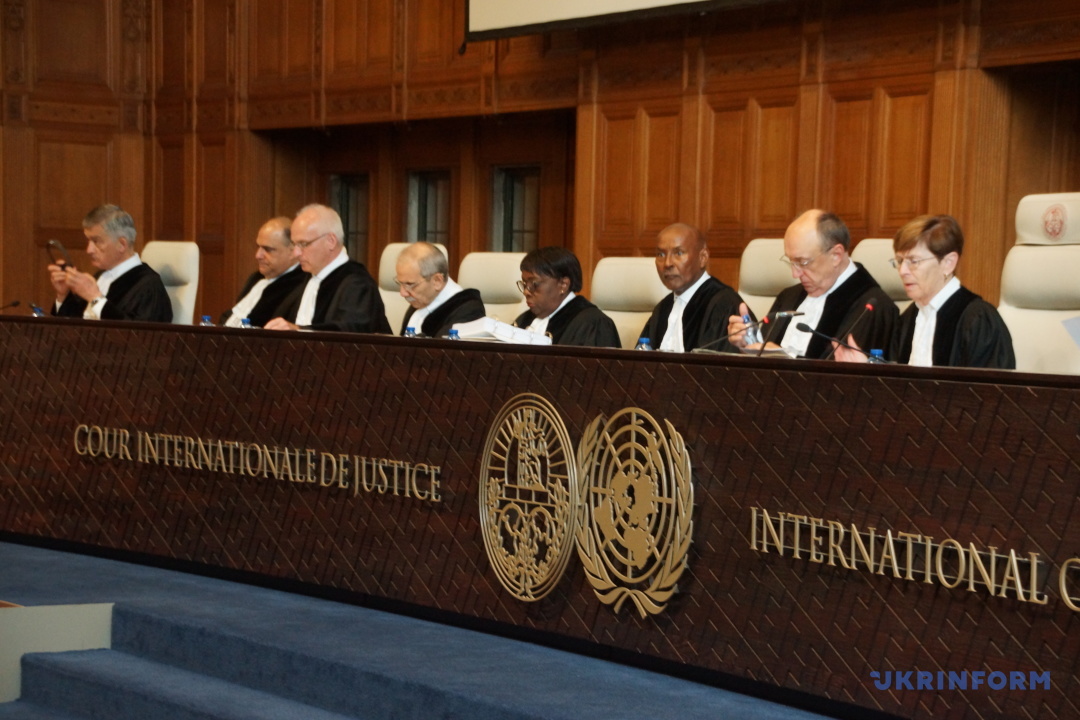The UN International Court of Justice held public hearings in the case of Russia's violation of conventions on the fight against the financing of terrorism and on the prohibition of all forms of racial discrimination.
On June 6 and 12, Ukraine's legal team took the stand, and on June 8 and 14, Russia's.
It is important that these hearings were devoted to the merits of the case, which means that after hearing the case, the Court must announce its decision.
Ukraine filed a lawsuit against Russia for violation of the two conventions with the International Court of Justice on January 16, 2017. Charges against Russia include providing weapons and other aid to illegal armed groups; the downing of flight MH17; shelling of residential areas of Mariupol and Kramatorsk; destruction of a civilian passenger bus near Volnovakha; an explosion during a peaceful meeting in Kharkiv; discrimination against the Ukrainian and Crimean Tatar communities; banning the activities of the Mejlis of the Crimean Tatar people; waves of abductions, murders, arbitrary searches, detentions; and restrictions on the teaching of the Ukrainian and Crimean Tatar languages.
Ukrainian lawyers delivered a busload of evidence of Russian aggression to the International Court of Justice. This is a memorandum, the main document that Ukraine submitted to the Court on June 12, 2018. It weighs about 90 kilograms, consists of more than 17,500 pages of text, is contained in 29 volumes and has 75 copies. It is symbolic that five years later, on the day the memorandum was handed over, on June 12, 2023, Ukraine had the floor in the Court.
However, in addition to the above-mentioned charges in the case, over the years, new Russian crimes in Ukraine have been added, which the Ukrainian side voiced to the Court during its speeches, in particular, that today Russia is openly launching thousands of missile strikes against Ukrainians, the Russian explosion of the Kakhovka hydroelectric power plant on June 6, 2023, on the first day of hearings at the International Court of Justice.
So what does the presence of Russia at the hearings at the International Court of Justice mean? When can the Court announce its decision? What are the current stages of other cases against Russia?
This was discussed in an exclusive interview with an Ukrinform correspondent in The Hague by Ambassador-at-Large of the Ministry of Foreign Affairs of Ukraine Anton Korynevych, Ukraine's Agent in the Court.
I HOPE FOR A VICTORY FOR UKRAINE ON THE LEGAL FRONT
- On June 6, the substantive hearings at the International Court of Justice in the case of Russia's violation of two conventions opened with your speech. How does it feel to speak at the podium at the International Court of Justice?
- It is a great honor to represent my country as an Agent at the International Court of Justice. It is also one of those things that are very important for a professional international lawyer. I mean, this is what you work for: to represent your country with the tools you know how to use - international law. So, first of all, this is a very great honor and an important professional story. The second point is the realization that today, in the situation of Russia's full-scale armed invasion of Ukraine, we, as Ukrainian lawyers, must do everything we can to support our armed forces and our defenders on the legal front. Of course, the main heroes are the Armed Forces, our defenders, their victories at the front, but we as lawyers must work every day to ensure that we win in courts, too, including in international judicial institutions, the UN International Court of Justice, to show the whole world and prove the whole array of violations that the Russian Federation commits. In my opinion, Russia is the biggest violator of international law in the modern world.
I think the moment will come when each of us will have to answer the question: what did you do during the great war? And I want to be able to say to my state, to my citizens, to my family, to myself: I did what I had to do, and what I know how to do, we ensured this process. So I hope that Ukraine will win on the legal front.
- In my opinion, some of the Russian representatives who spoke in the Court after the Ukrainian side had presented its arguments did not look very confident. Were you nervous before your speech at the International Court of Justice?
- Of course, any person is nervous before such events, but I think our entire team showed that we always act first and foremost as professionals. We present our position using all the available data and facts properly, guided by all the norms of international law applicable to this particular situation. And I think that in my speech that opened these hearings, you can see all the elements of such a position. So maximum concentration, maximum mobilization are the key components. And I think that all our representatives - the Co-Agent, the legal counsels - have certainly shown high professionalism during the oral hearings of our rounds on June 6 and 12.
- Have you met with the representatives of the Russian Federation and seen their reaction to your speeches?
- I am not really interested in Russia's reaction. We have our work to do, and we have to do it as well as possible, to present Ukraine's position professionally and ultimately provide the International Court of Justice with all the arguments it needs to make a decision. I think we have coped with this task. We did the best we could do. I am not interested in the Russian side, its arguments, their quality, I am only interested in Ukraine's victory.

UKRAINE'S FIRST CASE AGAINST RUSSIA TO BE HEARD ON THE MERITS
- As for the arguments of the Russian Federation, one could see, to put it mildly, the surprise of foreign colleagues in the press room, especially at what was said about Russia's non-involvement in the downing of flight MH17, while the evidence presented and the decision of the District Court of The Hague testify to this, Moreover, the conclusion of the Joint Investigation Team (JIT) on the investigation of the downing of MH17 announced in February this year that "there are strong indications that the Russian President made decisions to supply heavy weapons to the DPR militants".
The Russian side has also denied that the so-called DPR and LPR are terrorist organizations funded by Russia. At times, the nonsense heard from Russia even caused laughter among journalists. Could Russia be punished in the future for deliberately distorting the truth, facts, ignoring evidence, in fact, lying in the International Court of Justice?
- I would say that this is not the key - prosecution for lying in the Court. The key is to have the same reaction as your colleagues in the press room, the judges of the International Court of Justice - that's the main thing. I think that when we assess the quality of legal arguments, there is nothing to talk about. It is important for us to present Ukraine's position in a professional manner. I think everyone will be able to see and understand the Russians and their position for themselves, to analyze everything. You know, we started our speeches on June 6 by saying that Russia despises international law and believes that force is the determining factor. We said that international law matters. And we are certainly waiting for the relevant decisions of the International Court of Justice, which will establish these violations of international law by the Russian Federation. I think that in the June 12 speech of the Co-Agent of Ukraine, it was very clearly shown what the Russian Federation is doing during the oral hearings: it is building "Potemkin villages" - a facade, a cardboard, which is aimed at making the world believe in it. But this is not true, it is an absolute lie.
- Let’s imagine that after such powerful arguments from Ukraine, the Court ruled in favor of Ukraine. What does this mean for us? And what new tools do we have?
- First of all, it will be very important, because this is the first case of Ukraine against Russia in international judicial institutions that is heard on the merits. So let's really hope that this will be the first judgment on the merits, and that it will be the first judgment on the merits, of course, in our favor. Once again, the Ukrainian legal team of the Ministry of Foreign Affairs of Ukraine, legal advisers, members of the delegation and experts have done their best to present all available arguments to the court to make the appropriate decision. This decision is important to us because we hope it will record Russia's violation of two conventions: The International Convention for the Suppression of the Financing of Terrorism and the International Convention on the Elimination of All Forms of Racial Discrimination. It will also establish that Russia must be held accountable for these violations. This decision will obviously establish that the Russian Federation must take actions to prevent the recurrence of the relevant violations, and that the Russian Federation must pay appropriate compensation for its violations. The amount of compensation is decided in a separate proceeding when there is a decision on the merits, i.e., the decision on the merits will open the way for the International Court of Justice to begin to establish the extent of the required compensation from the Russian Federation.
- Can the Russian Federation ignore the judgment of the International Court of Justice? It has already ignored two Orders of the International Court of Justice. The first was in the case of Russia's violation of two conventions, when an order for provisional measures was announced on April 19, 2017. The International Court of Justice ruled that Russia must resume the activities of the Mejlis of the Crimean Tatar people and ensure the availability of education in the Ukrainian language in Crimea. The second Order is in the case against Russia on "genocide charges". The International Court of Justice ordered Russia to immediately stop its invasion of Ukraine. This order was announced on March 16, 2022. Will Russia eventually comply with all the decisions to return from isolation and pay compensation?
- First of all, it is important for us - the Ukrainian legal team, the Ministry of Foreign Affairs team, legal advisers - that this case is completed properly, because we need decisions of international judicial institutions on violations of international law by the Russian Federation. It is one thing when we, as citizens of Ukraine, speak about these violations, and this is important: a civic position, a political position. But we understand that the grounds for responsibility at the international level are the decisions of international courts. Therefore, we need these decisions, we need a portfolio of such decisions. And I am sure that the day will come when these decisions will be enforced. We are not really interested in what Russia thinks about it. The decisions of the International Court of Justice are binding. The state cannot fail to comply with the decisions of the International Court of Justice, and failure to comply with the decisions of the International Court of Justice is a violation by the state, which is what we emphasized when we spoke: failure to comply with the Interim Measures Orders is a violation of the binding Interim Measures Orders of the International Court of Justice. The Russian Federation is in court, the Russian Federation is in the process - you can see it. I think that the day will come when everything that international judicial bodies decide about Russia's violation of international law will be implemented. Therefore, we need to have these decisions, because we need, in particular, to have a base of such decisions and to say that this is not only the position of Ukraine, the state that is a victim of aggression, but also the decisions of international judicial institutions.

IT IS IMPORTANT TO CONVEY UKRAINE'S POSITION TO THE WORLD, BUT IT IS ALSO IMPORTANT TO HAVE DECISIONS OF INTERNATIONAL COURTS
- Yes, it is. It is also important that international court decisions influence public opinion, because there are also victims of Russian propaganda among people living in the EU. In particular, on March 17, 2023, it became known that the ICC Pre-Trial Chamber had issued arrest warrants for Putin and Lvova-Belova, who are suspected of committing war crimes: deportation and illegal transfer of children from the occupied territory of Ukraine.
- Of course, decisions of international courts or decisions that have an international resonance, such as the decision of the District Court of The Hague on MH17, are very important things. Ukraine's position is loud, we communicate it, it is heard in the world, but there are judicial institutions that impartially consider the case and make appropriate decisions, so this is extremely important. It is important to convey Ukraine's position to the world, but it is also important to have decisions of international courts, because the decisions of these courts are considered impartial, unbiased and really made by neutral judges. Again, you have heard all the arguments about MH17 presented by the other side: a global conspiracy theory against Russia involving everyone. We hope that all this will be given a proper legal assessment.
- What are the current stages of other cases against Russia, in particular, the lawsuit against Russia in the International Court of Justice demanding that the aggressor be held accountable for distorting the concept of genocide?
- We do have a case in the International Court of Justice on genocide charges. Let me remind you that we filed this lawsuit on February 26, 2022, two days after the start of the full-scale invasion. Its essence is precisely that Russia used and manipulated the provisions of the Genocide Convention, accusing our country of the alleged genocide that Ukraine allegedly committed in Donbas since 2014. Therefore, Russia used this as a pretext for the deployment of troops and a full-scale invasion on February 24, 2022. I would like to note that many states joined this case with their interventions, namely 33 states, and on June 5, 2023, the International Court of Justice issued an Order stating that the interventions of 32 states were admissible, and this essentially became the case of the "Civilized World vs. Russia". This is an unprecedented number of participants, and obviously in the near future we can expect that hearings will be held in this case as well. The position of the countries has already been stated in their applications, which is important, and they are also available on the Court's website, and can be read. This is a large number of states that have intervened and joined us in this case. And, yes, this speaks in favor of Ukraine and our position in the International Court of Justice.
- Can more countries join the case?
- They can at other stages, but what we have now - more than thirty countries - is very, very significant. Again, this number is unprecedented.
- What is the situation with maritime cases? The case of Ukraine vs. Russia concerning the detention of Ukrainian warships and sailors in the Kerch Strait in November 2018. Also, arbitration under the auspices of the Permanent Court of Arbitration in The Hague is considering a case on a claim that Russia has violated the UN Convention on the Law of the Sea in the Black and Azov Seas and in the Kerch Strait.
- Everything is in the works. Each case is being given due attention, each case is in constant progress, so sooner or later there will be news on these cases as well.
WE DID EVERYTHING TO ENSURE THAT THE UN INTERNATIONAL COURT OF JUSTICE MADE THE APPROPRIATE DECISION
- Is the case of Ukraine vs. Russia on two Conventions in the International Court of Justice the first case to reach the hearing on the merits?

- For example, the case of violation of the International Convention for the Suppression of the Financing of Terrorism and the International Convention on the Elimination of All Forms of Racial Discrimination is the first Ukraine vs. Russia case in international courts to be heard on the merits.
- It is symbolic that on June 12, 2018, Ukraine submitted a memorandum to the International Court of Justice, and five years later, on June 12, 2023, Ukraine had the floor in the Court. Do you feel anything special about the timing of this?
- There is, of course, the pleasure and understanding that all this has brought us to where we are: the merits phase of the case has already begun, we have reached this point, we have won jurisdiction. This is an important progress that we are showing. We did our best to present our position professionally, and all the arguments are on our side.
- Five years ago, Ukraine submitted to the International Court of Justice a memorandum that weighs about 90 kilograms, consists of more than 17,500 pages of text, is contained in 29 volumes and has 75 copies.
- There is no shortage of materials. We have done our best to ensure that the Court has everything it needs to make the appropriate decision.
THESE CASES WILL BE STUDIED BY STUDENTS OF INTERNATIONAL LAW
- What do these substantive hearings on the two Conventions at the International Court of Justice mean for history? There are a lot of students in the Courtroom, on the balcony, watching the proceedings. In fact, history is being made before their eyes. How will Ukraine enter this history? Will students in the future learn that Russia is an aggressor country, and Ukraine has been civilized from the very beginning after the temporary occupation of Crimea to apply to the Court?
- You know, as an international lawyer, I continue to teach at Shevchenko University, at the Institute of International Relations. And this is definitely important, because all these cases really become a material for analysis and research for students studying international law. There are classic cases that date back to the 1940s and 50s, but it is certainly important to add modern cases to them. This case we are talking about now is important and symbolic because it is a systemic violation of the Convention on the Prohibition of All Forms of Racial Discrimination against two ethnic communities: the Crimean Tatar people and ethnic Ukrainians in Crimea. And what is also important is that this is the first case on the merits under the International Convention for the Suppression of the Financing of Terrorism. That is, the International Court of Justice has never heard a case under this Convention, so this is the first time. And in general, realizing that everything is happening during the largest aggressive war in Europe after 1945, I think this is fueling interest in this case from the professional legal community.
- How do your students react to your appearances at the International Court of Justice?
- Nowadays, I teach mostly online. I'm used to going online from wherever I am, usually in Kyiv at 8 a.m. If I'm on a business trip to the EU, it's 7 a.m. If it's another continent, it's a different time. And I try to use every opportunity to communicate with students, to talk about the theory, but also to tell them how things work in practice. I try to saturate all these things with practical elements.

- Special Tribunal. It seems that The Hague is not against the Special Tribunal for the Crime of Aggression being here. What should it look like? Perhaps a Nuremberg-like trial?
- The issue of establishing a new judicial body is a serious one, which will take time to resolve, and requires appropriate consultations with partners. I personally think that the location of the tribunal in The Hague, regardless of its format, is a logical step. The Hague is the capital of international justice, and everything related to international law is located here in one way or another, regardless of the form. It would be symbolic, right and logical. Of course, this is not a simple process, but it is important that the Core Group for the establishment of the Special Tribunal now includes 37 states and several international organizations. We are showing that there is a unity of principle and purpose: a judicial mechanism for the crime of aggression against Ukraine must be created, because this crime of aggression cannot be ignored. I hope that we will find answers to all questions.
In early July, the International Center for the Prosecution of the Crime of Aggression against Ukraine (ICPA) will start working in The Hague. So there is movement forward: if an investigative body has been created, there should be a court. This is the first time that an initiative to investigate the crime of aggression has been created with international support since World War II. The crime of aggression allows us to condemn the war as such, that is, to condemn this entire Russian war as aggressive, through individual criminal liability, through the crime of aggression. I think that is why it is so important to create a Special Tribunal.
Iryna Drabok, The Hague
Photo by the author
